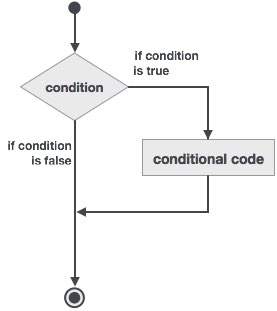
- Fortran Tutorial
- Fortran - Home
- Fortran - Overview
- Fortran - Environment Setup
- Fortran - Basic Syntax
- Fortran - Data Types
- Fortran - Variables
- Fortran - Constants
- Fortran - Operators
- Fortran - Decisions
- Fortran - Loops
- Fortran - Numbers
- Fortran - Characters
- Fortran - Strings
- Fortran - Arrays
- Fortran - Dynamic Arrays
- Fortran - Derived Data Types
- Fortran - Pointers
- Fortran - Basic Input Output
- Fortran - File Input Output
- Fortran - Procedures
- Fortran - Modules
- Fortran - Intrinsic Functions
- Fortran - Numeric Precision
- Fortran - Program Libraries
- Fortran - Programming Style
- Fortran - Debugging Program
- Fortran Resources
- Fortran - Quick Guide
- Fortran - Useful Resources
- Fortran - Discussion
Fortran - if-then construct
An if… then statement consists of a logical expression followed by one or more statements and terminated by an end if statement.
Syntax
The basic syntax of an if… then statement is −
if (logical expression) then statement end if
However, you can give a name to the if block, then the syntax of the named if statement would be, like −
[name:] if (logical expression) then ! various statements . . . end if [name]
If the logical expression evaluates to true, then the block of code inside the if…then statement will be executed. If logical expression evaluates to false, then the first set of code after the end if statement will be executed.
Flow Diagram

Example 1
program ifProg
implicit none
! local variable declaration
integer :: a = 10
! check the logical condition using if statement
if (a < 20 ) then
!if condition is true then print the following
print*, "a is less than 20"
end if
print*, "value of a is ", a
end program ifProg
When the above code is compiled and executed, it produces the following result −
a is less than 20 value of a is 10
Example 2
This example demonstrates a named if block −
program markGradeA implicit none real :: marks ! assign marks marks = 90.4 ! use an if statement to give grade gr: if (marks > 90.0) then print *, " Grade A" end if gr end program markGradeA
When the above code is compiled and executed, it produces the following result −
Grade A
fortran_decisions.htm
Advertisements